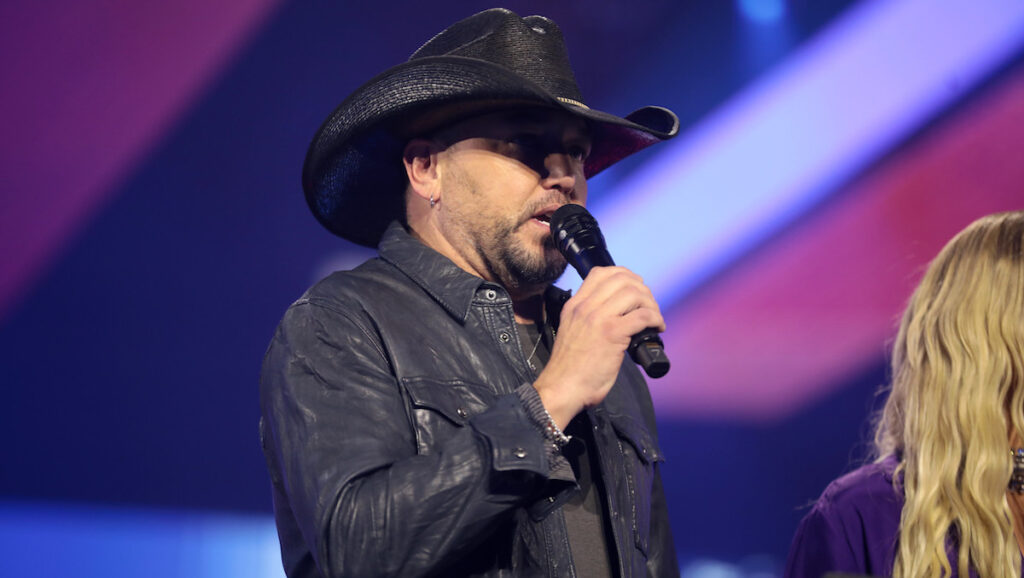At first glance, Jason Aldean’s song “Try That in a Small Town” sounds like any other pop country song these days. It hits all the same notes of small-town pride and bravado, treading over the same territory you’d hear in literally hundreds of other country songs being put out at any given time.
But what makes Aldean’s song unique – and the subject of recent controversy – is the accompanying music video, which has stirred up strong reactions on both sides and has ultimately been pulled from Country Music Television’s music video rotation for the time being.
Why Are People Upset Over the “Try That in a Small Town” Music Video?
The issues here stem from fairly common country lyrics that have been enflamed by a music video that is ignorant at best, and pro-lynching at worst, as some have suggested.
Plenty of country songs wax poetic on how much the singer would like to beat the ever-loving hell out of people who disrespect the American flag or the United States at large. Most times, the interpretation of who a singer is talking about is left intentionally vague, but here, Aldean is a little more specific in who he’s talking about. Take a look at the “Try That in a Small Town” lyrics below:
Sucker punch somebody on a sidewalk
Carjack an old lady at a red light
Pull a gun on the owner of a liquor store
Ya think it’s cool, well, act a fool if ya likeCuss out a cop, spit in his face
Stomp on the flag and light it up
Yeah, ya think you’re toughWell, try that in a small town
See how far ya make it down the road
Around here, we take care of our own
You cross that line, it won’t take long
For you to find out, I recommend you don’t
Try that in a small townGot a gun that my granddad gave me
They say one day they’re gonna round up
Well, that shit might fly in the city, good luck
Clearly, Aldean is speaking to a certain audience – the “good ‘ol boys, raised up right,” whatever that means – perhaps one convinced that every single city is a crime-ridden hell that can’t be saved. That same audience will also typically see a movement like Black Lives Matter in an especially negative light politically and socially, which is to say nothing about how some people might feel about it racially.
All of this is amplified by the music video, which is far more overt in what it’s telling a viewer to feel. The music video features various news clips of protests and police confrontations, some of which took place during riots sparked by police killings in recent years. Other random crimes are sprinkled in to drive Aldean’s point home that Black Lives Matter – and anyone who supports it – is more or less a criminal, which no doubt has inherently racist undertones.
Additionally, in the music video, Aldean is singing in the public square of Columbia, Tennessee, directly in front of the Maury County Courthouse, which has a grim, racist past as the site of the 1927 lynching of Henry Choate and an infamous 1946 race riot that nearly ended with the lynching of future Supreme Court justice Thurgood Marshall.
Jason Aldean’s Response to the Music Video
Naturally, Aldean has vigorously defended himself on social media, vehemently denying any political or racial undertones in his song or music video, though that’s a tough thing to believe when you project a video of a flag burning on the site of historical violence against Black people, spitting in the face of the events that transpired there and taking a very specific and identifiable stand in today’s political climate.
I’m willing to give Aldean the benefit of the doubt that he didn’t choose the location for the music video and likely didn’t know the area’s history, but it’s clear where he stands on certain issues, and I’m willing to bet he has some thoughts about, say, Black Lives Matter that he’d only share in private. And clearly he endorses the content and undertones the song presents.
Perhaps that’s not all entirely fair. Perhaps I’m truly misunderstanding the intent of Aldean’s song. Maybe it has nothing to do with a fantasy of shooting up liberals – or the boogeyman image of them concocted by cable news and right-wing media – and maybe it’s only a song about “people helping people,” as the bizarre, out-of-left-field interlude about farmers in the music video would suggest.
But I think I’ve seen enough of this dog-whistling media to know exactly what it’s trying to say. As expected, Aldean and the rest of right-wing media have rallied around the song, decrying “cancel culture,” meaning this will serve as the ideal red meat for the conservative news cycle for at least a few weeks, until Bud Light decides to have the audacity to say gay people have rights or something.
From there, we’ll just continue on to yet another battle in what has become an eternal culture war with no end in sight.
(Photo credit: Gage Skidmore)
